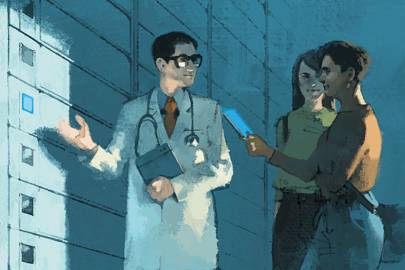
Marc Aspinall
In 2021, people will gain access to their health data and use it to make decisions about their medical care. And those funding healthcare – public bodies or private organisations – will redesign systems to meet these expectations.
Research published in July 2020 by GSK, the pharmaceutical conglomerate, found that 84 per cent of people in Spain, 77 per cent in the UK, 75 per cent in Italy and 63 per cent in Germany consider it important to take their health into their own hands to relieve pressure on healthcare systems. Consumers have also become accustomed to managing many aspects of their lives remotely via technology; they wonder why the same is not possible when it comes to their health.
Healthcare systems will evolve to accommodate the demands of individuals who want to engage not as patients, but as consumers, owning their healthcare journey through education, prevention, diagnosis and choice of services. The development of next-generation digital healthcare will become increasingly pivotal to meeting society’s new needs.
One change we are already seeing is the rapid expansion of telemedicine. In April, the UK’s Royal College of GPs reported that doctors were seeing just seven per cent of their patients face-to-face, compared with 80 per cent in 2019. Rather than calling a surgery for an appointment, many patients now complete an online e-consultation form – where they enter details of their symptoms – before being phoned by a doctor.
This emerged as a Covid-19-related measure, but the UK government has said it would like to see the majority of GP consultations done this way in 2021. The evidence suggests that consumers should be broadly in favour of this approach. A 2018 survey for the Nuffield Trust, the health think-tank, found that 63 per cent of UK adults would be willing to have a video consultation with their GP for a minor ailment, and 55 per cent for advice on an ongoing condition or problem.
This shift towards digital delivery is being matched by a greater sense of urgency among healthcare-procurement systems. In March 2020, the UK’s National Health Service selected digital-health providers through a procurement process completed in a record-setting 48 hours. Doctors, who have a critical role in this evolution, are also starting to acknowledge the productivity benefits of telehealth and remote care. A survey of primary-care providers in the US in 2020 found that 40 per cent believe digital health solutions provide “definite advantage” in patient care.
In 2021, we can expect to see a conflation of these trends, with at least some public-payer systems offering consumers access to their own data, and changing reimbursement to let people make more decisions around prevention and self-help. This might involve, for example, allocating some budget towards letting patients order their own screening tests for certain conditions, if a combination of their own data, family history and symptoms mean they feel at risk.
As the legacy of the pandemic starts to crystallise, in 2021 will see digital technologies shape healthcare systems that are based around the needs of the most important stakeholder – not the payer or the provider, but the consumer.
Sonali De Rycker is a partner at Accel, a venture-capital firm specialising in early investor funding
"along" - Google News
December 15, 2020 at 01:05PM
https://ift.tt/3nlv3Wy
Digital healthcare was the future. Then along came Covid-19 - Wired.co.uk
"along" - Google News
https://ift.tt/2z4LAdj
https://ift.tt/35rGyU8
Bagikan Berita Ini














0 Response to "Digital healthcare was the future. Then along came Covid-19 - Wired.co.uk"
Post a Comment